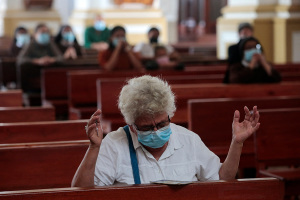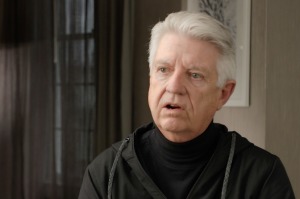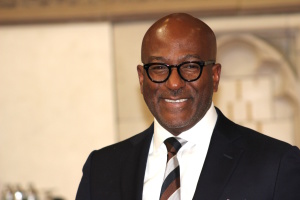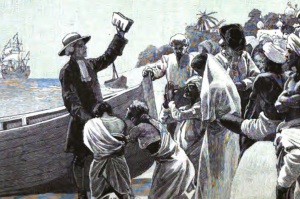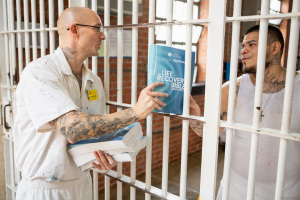Ambassadors of Reconciliation: Taming the Savageness of Racism
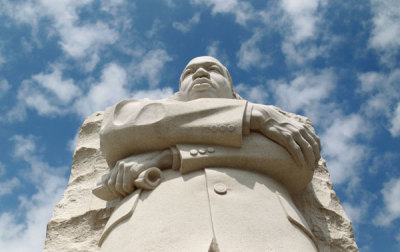
Fifty years ago, James Earl Ray shot and killed Baptist preacher and civil rights leader Martin Luther King Jr., in Memphis, Tennessee. MLK was just 39 years old. It's fitting that we remember and reflect on the man and his mission. Actually, I think it would honor him better if we reflected more on his mission and less on him, for if we focus too heavily on him, we will find a mere mortal, a man who was subject to the trials and temptations common to all of humanity. And like the rest of us, he did not always come out victorious. So let's speak a little about the man and a lot about the mission!
In the Bible, we learn the importance of names. Abram became Abraham. Jacob became Israel. Saul became Paul. The point is that sometimes God gives His children new names to represent the new thing He's doing. Did you know that MLK Junior's real name was not Martin Luther King Junior? His name was actually Michael King Junior. There is some confusion as to when and why his father (Michael King) changed BOTH of their names to Martin Luther King, but it clearly had to do with the great reformer, Martin Luther. This name and legacy was one that both father (also a Baptist preacher) and son wore proudly. In the words of MLK Sr., "I was elated to know that I had really been named for the great leader of the Protestant Reformation... I gladly accepted Martin Luther King as my real name and when [my son] M.L. was born, I proudly named him Martin Luther King, Jr." There is power in a name! Can you imagine how having such a name would have impacted your self-understanding, your identity, your sense of mission? I think MLK Jr. certainly had a sense of cause, purpose and mission from a very early age.
About that mission... Throughout much of his adult life and ministry, MLK received death threats from racists, some of whom had no qualms with blowing up children in churches. Yet that did not stop him from praying, planning, marching, lobbying, scheming and DREAMING about what he knew to be right. He had a dream...
In 1963, at the March on Washington for Jobs and Freedom, which MLK helped organize, he delivered his famous 17-minute "I Have a Dream" speech from the steps of the Lincoln Memorial, including the following portions:
I have a dream that my four little children will one day live in a nation where they will not be judged by the color of their skin but by the content of their character.
I have a dream that one day every valley shall be exalted, and every hill and mountain shall be made low, the rough places will be made plain, and the crooked places will be made straight; "and the glory of the Lord shall be revealed and all flesh shall see it together."
Do you have goosebumps right now? I do. Every time I hear or read these words, I have a powerful physical and emotional reaction. And just as much so when I read or hear the next section of his speech, the "Let Freedom Ring" part. (You can hear or read the entire speech here.) But I want to stop here because of Isaiah 40:4–5, which King fittingly included, because THAT, for us — as worshippers of Jesus Christ — is our ultimate hope and dream: that the glory of the Lord be revealed and all flesh see it together. I can't imagine a more powerful force or event or cause of global and eternal reconciliation than all of humanity seeing the glory of God together! The glory of God is powerful! It is awesome, because He is awesome! There is no one who more greatly desires reconciliation — racial and otherwise — than God. And there is no force to bring it about that is greater than the power and love and Spirit of God. And there are no people who have more reason and resources to bring it about than the people of God. And there is no one who paid a greater price to bring it about than God Himself, through His Son Jesus Christ:
13 But now in Christ Jesus you who once were far away have been brought near by the blood of Christ. 14 For he himself is our peace, who has made the two groups one and has destroyed the barrier, the dividing wall of hostility, 15 by setting aside in his flesh the law with its commands and regulations. His purpose was to create in himself one new humanity out of the two, thus making peace, 16 and in one body to reconcile both of them to God through the cross, by which he put to death their hostility. (Eph. 2:13–16)
It is God who does the miraculous work of reconciling people and peoples to each other and TO HIMSELF. He does it on the basis of Christ's work on the cross, and consequently gives this precious ministry of reconciliation to us! We are His ambassadors:
17 Therefore, if anyone is in Christ, that person is a new creation: The old has gone, the new is here! 18 All this is from God, who reconciled us to himself through Christ and gave us the ministry of reconciliation: 19 that God was reconciling the world to himself in Christ, not counting people's sins against them. And he has committed to us the message of reconciliation. 20 We are therefore Christ's ambassadors... (2 Cor. 5:17–20a)
While this ministry of reconciliation belongs principally and primarily to Christians ("For Christ's love compels us!"; 2 Cor. 5:14a), we can rejoice that we are not alone. There are people of good will of all races and colors and ethnicities who desire and work for peace and reconciliation in the U.S. and around the globe. Robert F. Kennedy was one of those people.
As a young senator seeking the Democratic presidential nomination in 1968, Bobby Kennedy learned of King's death just before arriving in a poor, African-American neighborhood in Indianapolis. With riots breaking out in other cities, the local police chief informed Kennedy that he didn't have enough officers to protect him if the same were to happen there. To his credit, RFK went anyway.
As with MLK, I do not want us to focus on the man. Some within the Kennedy family are, in many respects, the antithesis of what we ought to hold up as exemplary. But in this case, RFK delivered one of the most important (and oft-overlooked) speeches in recent U.S. history, so we ought to take note:
I have bad news for you, for all of our fellow citizens, and people who love peace all over the world, and that is that Martin Luther King was shot and killed tonight.
Martin Luther King dedicated his life to love and to justice for his fellow human beings, and he died in the cause of that effort.
In this difficult day, in this difficult time for the United States, it is perhaps well to ask what kind of a nation we are and what direction we want to move in. For those of you who are black — considering the evidence there evidently is that there were white people who were responsible — you can be filled with bitterness, with hatred, and a desire for revenge. We can move in that direction as a country, in greater polarization — black people amongst blacks, white people amongst whites, filled with hatred toward one another.
Or we can make an effort, as Martin Luther King did, to understand and to comprehend, and to replace that violence, that stain of bloodshed that has spread across our land, with an effort to understand with compassion and love.
For those of you who are black and are tempted to be filled with hatred and distrust at the injustice of such an act, against all white people, I can only say that I feel in my own heart the same kind of feeling. I had a member of my family killed, but he was killed by a white man. But we have to make an effort in the United States, we have to make an effort to understand, to go beyond these rather difficult times...
What we need in the United States is not division; what we need in the United States is not hatred; what we need in the United States is not violence and lawlessness; but is love and wisdom, and compassion toward one another, and a feeling of justice toward those who still suffer within our country, whether they be white or whether they be black.
So I shall ask you tonight to return home, to say a prayer for the family of Martin Luther King, that's true, but more importantly to say a prayer for our own country, which all of us love — a prayer for understanding and that compassion of which I spoke.
We can do well in this country. We will have difficult times; we've had difficult times in the past; we will have difficult times in the future. It is not the end of violence; it is not the end of lawlessness; it is not the end of disorder.
But the vast majority of white people and the vast majority of black people in this country want to live together, want to improve the quality of our life, and want justice for all human beings who abide in our land.
Let us dedicate ourselves to what the Greeks wrote so many years ago: to tame the savageness of man and make gentle the life of this world.
Let us dedicate ourselves to that, and say a prayer for our country and for our people. Thank you very much.
Let us dedicate ourselves to taming the sinful savageness of human hatred and racism. Let us dedicate ourselves to being agents of transformation, ambassadors of reconciliation. And let us dedicate ourselves to prayer for all nations (Mark 11:17) and for our nation and our neighbors, those of all races and ethnicities, languages and nationalities.
Originally posted at https://medium.com/@JoaoMordomo/ambassadors-of-reconciliation-9428045f23fb
















